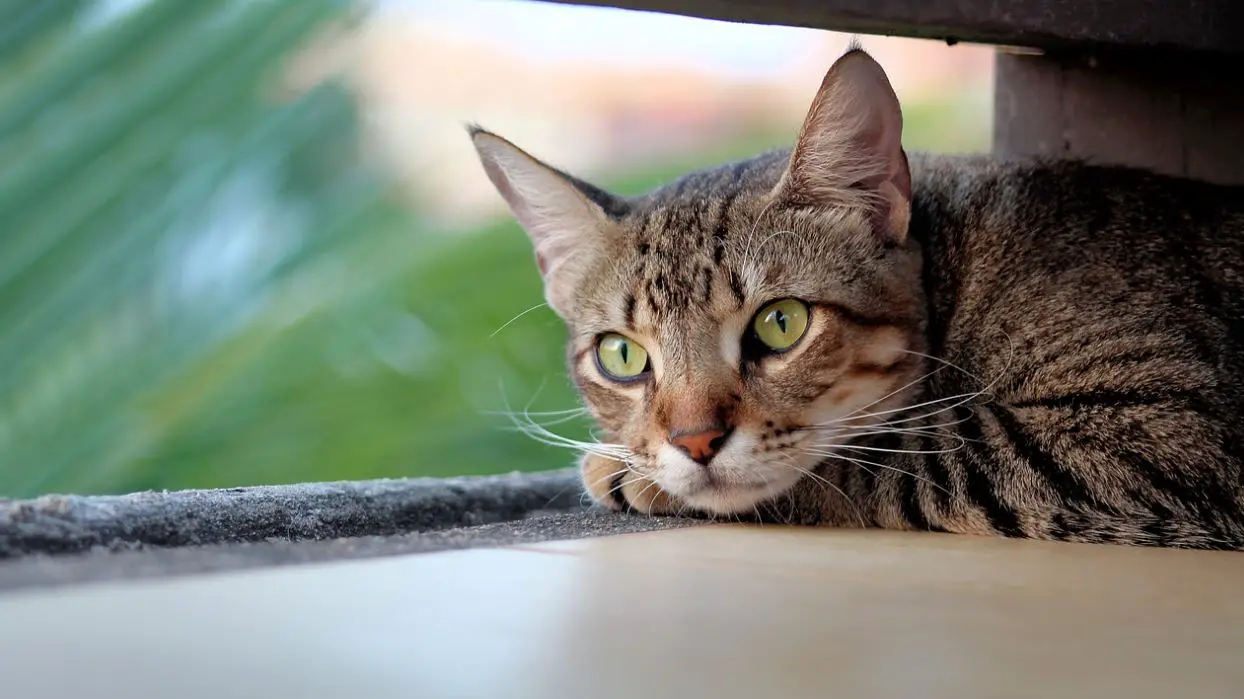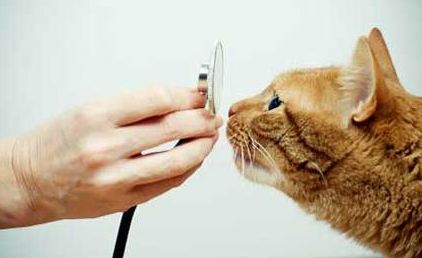What Can I Give My Cat For Allergies – A Complete Guide

The words ‘cat allergies’ often conjure up images of humans who have experienced an allergy to cat fur or dander. However, cat allergies can also refer to allergies that are being experienced by our feline friends, and these can be difficult to deal with.
As many cat owners will know, felines are very good at hiding health issues. However, when they suffer from allergies, the signs and symptoms are often obvious. Unfortunately, if your cat does suffer from allergies, there is no permanent cure. However, you can take steps to help control these allergies, just as you would with human allergies.
Allergies in cats most often affect the skin, although there may be other symptoms such as streaming eyes and sneezing. Excessive scratching, loss of hair, and discharge from the ears can also be an indication that your cat is suffering from an allergy. It is important to determine the trigger of the allergy and arrange appropriate treatment.
In this guide, we will look at some of the types of allergies cats can experience along with some of the signs and symptoms. You can also learn more about the various treatment options such as supplements, antihistamines, and allergy shots.
Playing Detective: Working Out if Your Cat Has Allergies

While our natural reaction to human allergies is to head to the medicine cabinet, dose ourselves up, and complain to anyone who will listen, cats can do very little to let you know if they are experiencing problems. The only way you can determine whether your cat has allergies is to look out for the symptoms.
So, what are the symptoms of allergies in cats? Well, there are various possible symptoms you should look out for according to the ASPCA. This includes:
- Excessive scratching
- Excessive sneezing
- Discharge from the ears or eyes
- Loss of fur
- Scabs and sores on the skin
- Diarrhoea and vomiting
You may also notice that your kitty appears to be very down and lethargic. According to Pet4Homes, some may also try to hide away, which is what cats often do if they feel unwell.
What Are the Causes of Cat Allergies?

As with humans, there are be various different causes of allergies in our feline friends. It is important to try and determine the cause, as part of the treatment will be to try and isolate the trigger as well as arrange appropriate treatment. Some possible causes of your furball’s allergies include:
- Pollen, mould, and dust
- Food
- Parasites and parasite treatments
- Cleaning products
- Fragrances
- Certain materials such as plastic or rubber
- Cigarette smoke
Identifying the Culprit: Some Different Types of Common Allergies
Human allergies can be triggered by a variety of different factors, and the same goes for cat allergies. Your fluffball may be experiencing problems for a wide range of reasons, and we will look more closely at some of the more common ones below. Some of the common allergies that can affect your feline friend include:
Food Allergies

Food allergies in cats are more common than many people realise – in fact, they are the third most common feline allergy according to the Cornell Feline Health Centre. If you feed your feline poor-quality cat food, it can result in allergies as well as failing to meet their nutritional needs.
If your cat has a food allergy, you may notice that it scratches at its head a lot. It can also lead to gastric and digestive problems, which could lead to vomiting and diarrhoea. Red, inflamed skin, hair loss, and flatulence are also possible signs of food allergies in cats.
Cornmeal is sometimes used in cheaper cat foods, and this is something many cats are allergic to according to Canna-Pet. Most cat foods also contain proteins that are found in grain and vegetables, which can lead to food allergies.
Lack of lactase enzymes means that cats are unable to tolerate dairy products in large quantities, so this is something else you have to be mindful of. Food with fish, eggs, wheat, and beef are also common sources of allergies in cats. So, you do have to be very careful about what your furball eats as part of a regular diet.
In order to deal with food allergies, it is advisable to arrange an appointment with your veterinarian. They will be able to more easily determine what type of food or ingredient your cat is allergic to. They can also recommend the best food based on your cat’s allergies, which means you can provide a safer, healthier diet for your kitty.
Seasonal Allergies
Many people suffer from seasonal allergies, but did you know that this is also something that can affect your cat? Well, some cats can develop allergies to grass and pollen, and this is something that can affect outdoor cats in particular.
You may notice your cat is sneezing, wheezing, and coughing, and it may have runny eyes. Throat irritation from these allergies can lead to snoring and you may notice excessive scratching, skin irritation, and bald patches.
If your cat appears to suffer from seasonal allergies, you should try to limit the amount of time spent outdoors, particularly when there is a higher pollen count. Also, try to reduce the level of contaminants in your home by vacuuming regularly, removing shoes when you come in, and even using a purifier.
You may find that despite taking these steps, your cat’s symptoms persist. In this event, it is best to take your cat to see the vet, as there could be another reason for the symptoms. The vet can also determine whether there is a suitable anti-allergy shot or treatment that may benefit your cat.
Skin Allergies

Skin allergies are also very common in cats, and this type of problem can be triggered by a number of things. It can be very difficult to determine what is causing these skin problems in your pet, so it is often down to the process of elimination. If there is no obvious cause, a trip to the vet is highly advisable so that they can get to the root of the problem.
It is important to note that your cat’s skin is one of the main indicators of an allergy. This could be an allergy to something in their food, a flea infestation, a reaction to flea treatment or other medication, or environmental allergen. Working out which of these is the primary cause is the difficult part.
Remember, your cat can also react to things such as household cleaners and products, fragrances and air fresheners, and even certain materials that can have an impact on its skin. Some cats have hypersensitive skin, and the effects of allergies for these kitties can be more profound.
If your cat does develop a skin reaction, it is always best to speak to the vet to ensure that it is an allergy. Your vet can perform proper checks to ensure there is no other underlying cause. In addition, a veterinarian can more easily determine what your cat is reacting to so that appropriate steps can be taken.
Environmental Allergies
There are lots of environmental contaminants that both humans and pets can be affected by. When it comes to your furball, things such as dust, mould, and even cigarette smoke can take their toll. Grass and pollen, which are the cause of seasonal allergies, also come under the umbrella of environmental contaminants that can affect your cat.
It can be difficult to determine which environmental factors are taking their toll on your cat’s health. If the allergies appear to be seasonal and could be the result of high pollen levels of grass, you should consider keeping your kitty indoors more. In addition, be very mindful of products you use around the home that your cat may be allergic to.
With so many different potential causes of your cat’s allergy, it is often best to take your ball of fluff to the vet for a check unless you are already certain of the cause. This will make it easier to identify the culprit.
Solutions for Dealing with Common Allergies

There are various solutions you can consider when it comes to dealing with common allergies in cats. Some of the key ones depending on the cause of the allergic reaction include:
Choosing the Right Diet
If your cat has a food allergy, you may want to consider a complete dietary change. You can get hypoallergenic cat food that is free from chicken and grain, which can help cats with food allergies. If you plan to purchase pre-packaged hypoallergenic cat food, make sure you invest in high-quality food from a reputable manufacturer.
Another option you can consider is a raw food diet and homemade cat food. While this does require more effort on your part, it is something that can have a big positive impact on your cat’s nutrition and can help to combat allergies. You need to ensure your kitty gets the essential nutrients for good health including protein, fatty acids, vitamins, and amino acids.
If you decide you want to opt for a raw food or homemade food diet for your pet, you will find plenty of recipes to help you online including those from feline-nutrition.org. However, if you have any doubts or concerns, always speak to your vet for further advice – it is always best to err on the side of caution when it comes to your cat’s diet and health.
Some cats may need to be put on a prescription diet for a period of 12 weeks until the symptoms of the allergy disappear. After that period, you can then start introducing the old foods back into the diet gradually to determine which of them was causing the problems in the first place. According to cat food experts, Purina, this is often the course of action the vet will take.
Antihistamines

There are antihistamines that can be prescribed for your pet, but these are generally a preventative measure to stop your cat from getting symptoms. This includes products such as Benadryl.
If your pet suffers from something like seasonal allergies every year, you could get these antihistamines in preparation to prevent symptoms. Some people find it very hard to give their cats medication but you can learn more about doing this through this video.
Cat Allergy Shots
When your cat is suffering from an allergy, your vet may be able to prescribe allergy shots, cortisone, or steroids depending on the type, symptoms, and severity of the allergy. Allergy shots are often the best option, as they deal with the actual allergy rather than just relieving some of the symptoms and discomfort.
Supplements
Your kitty may also benefit from having supplements such as fatty acid supplements or Allergy Immune Supplements. Fatty acids are important for your cat’s health according to Catherine E. Lenox from Royal Canin. These can help to relieve the itching and make your cat more comfortable. There are also various spray-on products and shampoos that contain vital ingredients to help combat the symptoms of allergies.
When to Consult Your Vet Regarding Cat Allergies

If your cat is displaying symptoms of an allergy, it is important to never assume that is the case. If you have any doubts, you should always take your cat to the vet to be checked, as there could be other underlying causes.
Likewise, if you know your cat is experiencing an allergic reaction but you don’t know what the cause of it is, a trip to the vets can be invaluable. They will be able to perform checks and carry out tests to determine the culprit.
The Bottom Line
As you can see, there are various allergies your feline friend may suffer from and various symptoms that may be displayed. No cat owner wants their pet to be left in discomfort, so it is vital that you take the appropriate steps to deal with the symptoms or look at preventative measures for problems such as seasons allergies that arise every year.
While there is plenty of advice available online, you should always contact the vet if there are any doubts. By doing this, you can ensure your pet receives the most effective and appropriate treatment for its allergies. This can save you a lot of time and stress as well as providing faster relief for your cat.
Of course, it can be difficult to deal with allergies in cats because your cat cannot speak and tell you how they are feeling. However, simply being observant can help you to pick up on any allergy issues and symptoms. Look out for the symptoms outlined in this article and try some of the steps suggested to help relieve these symptoms.


